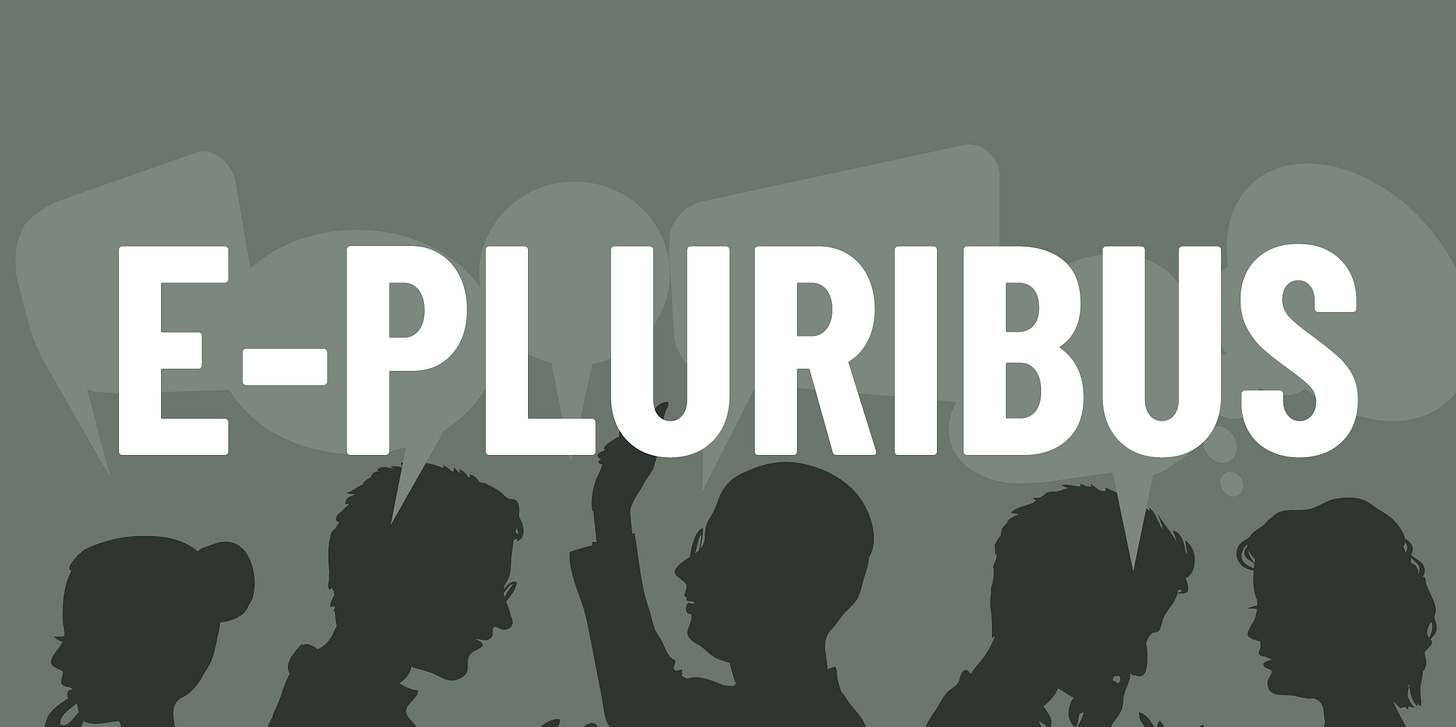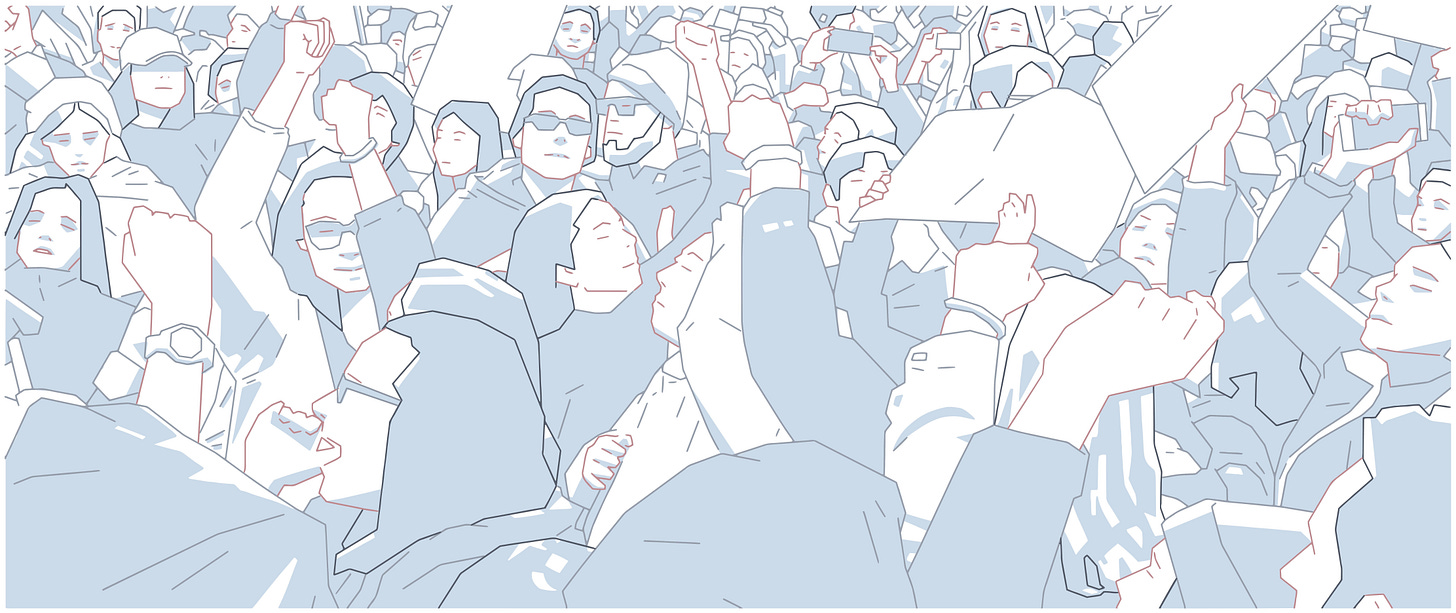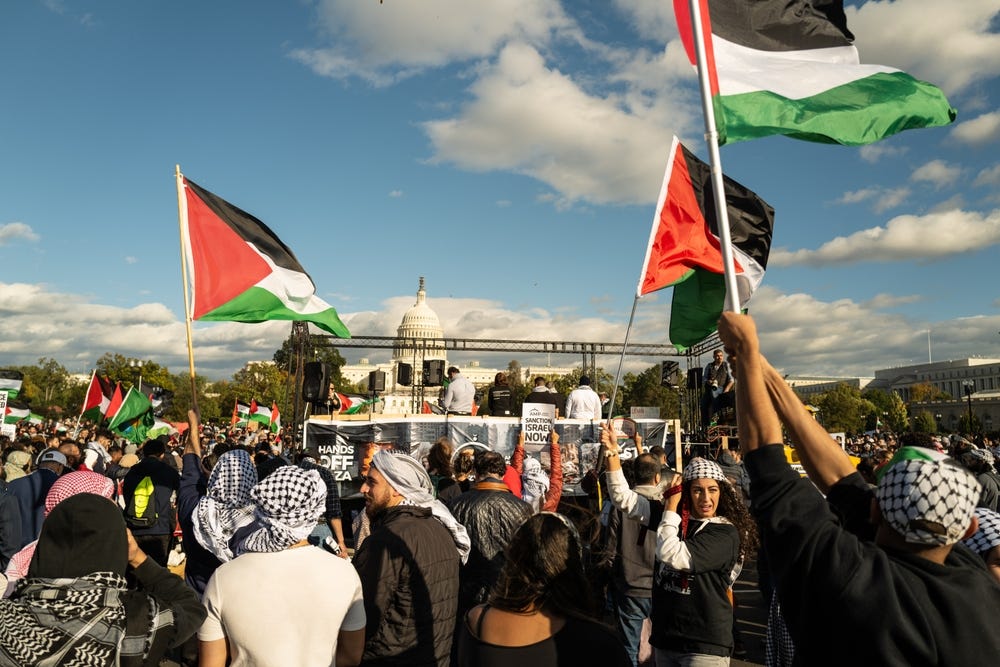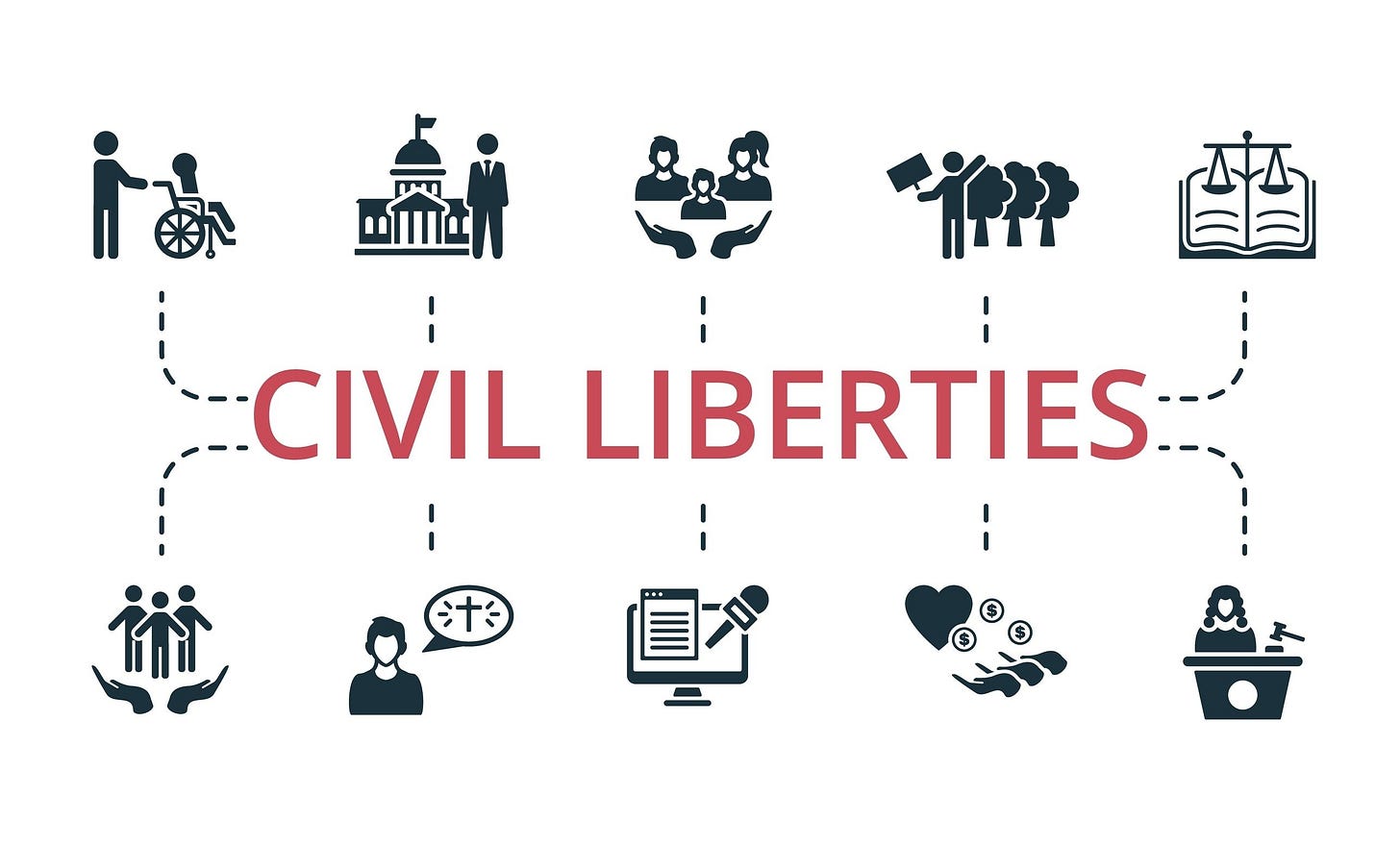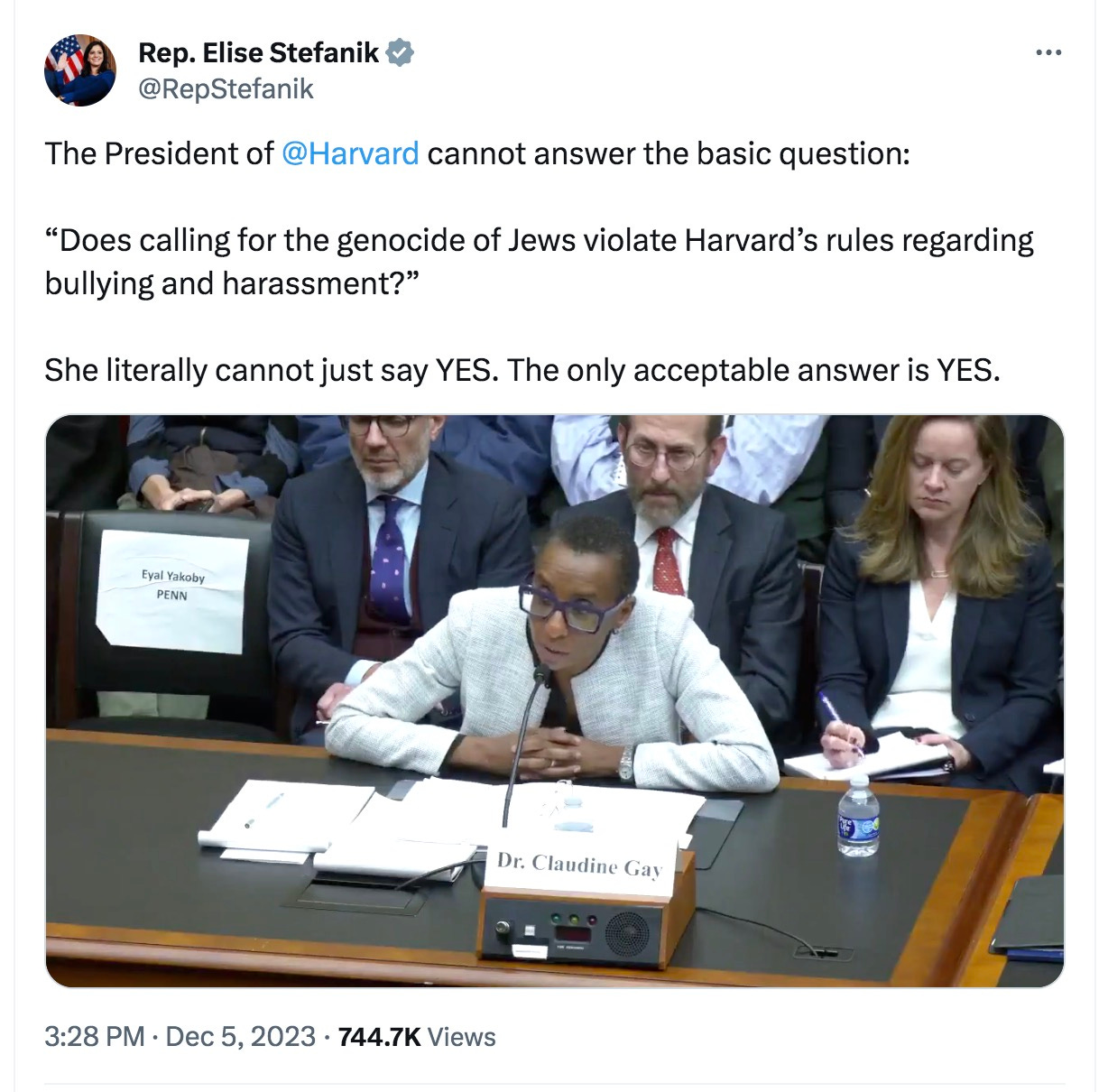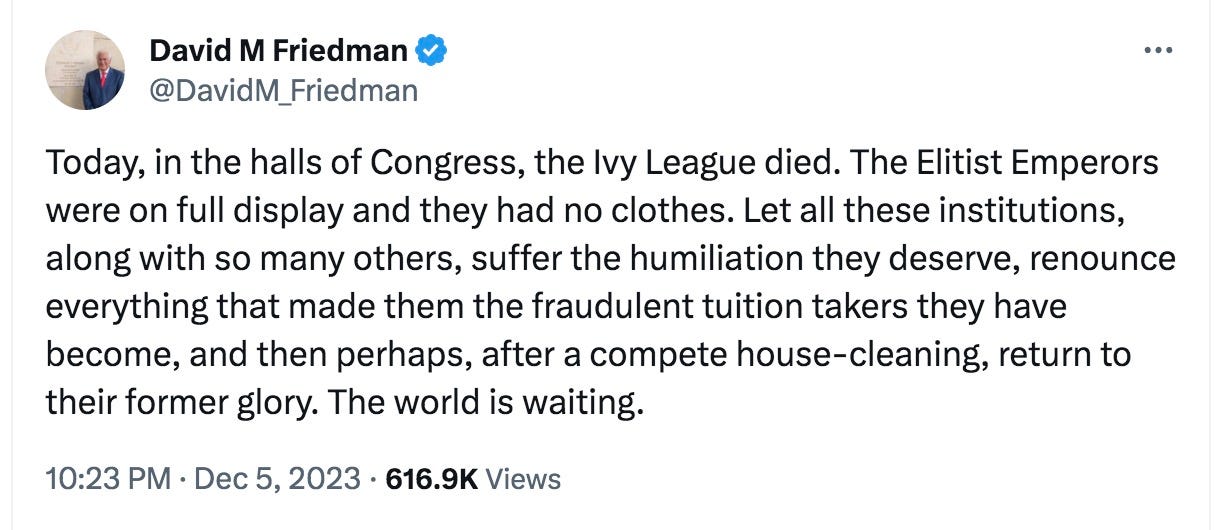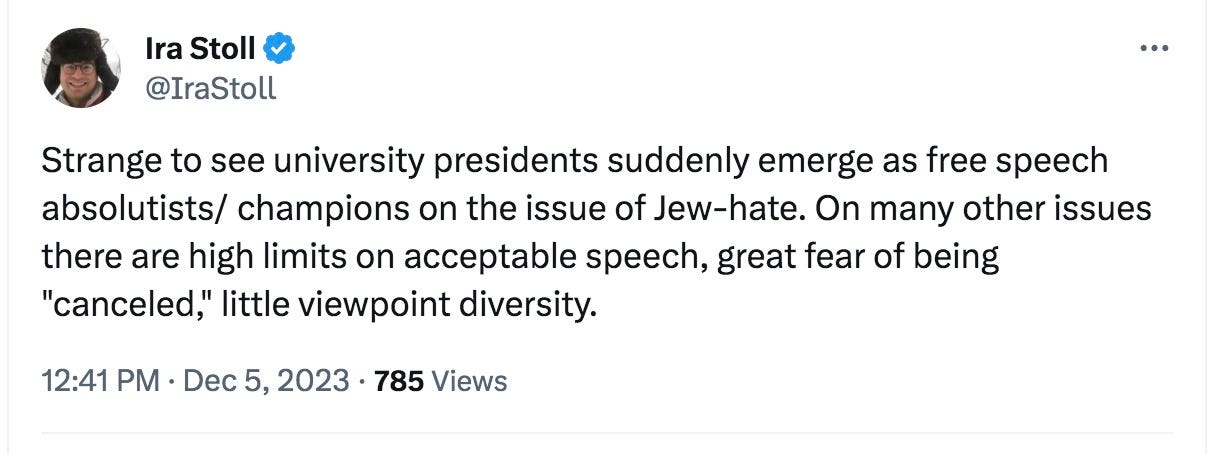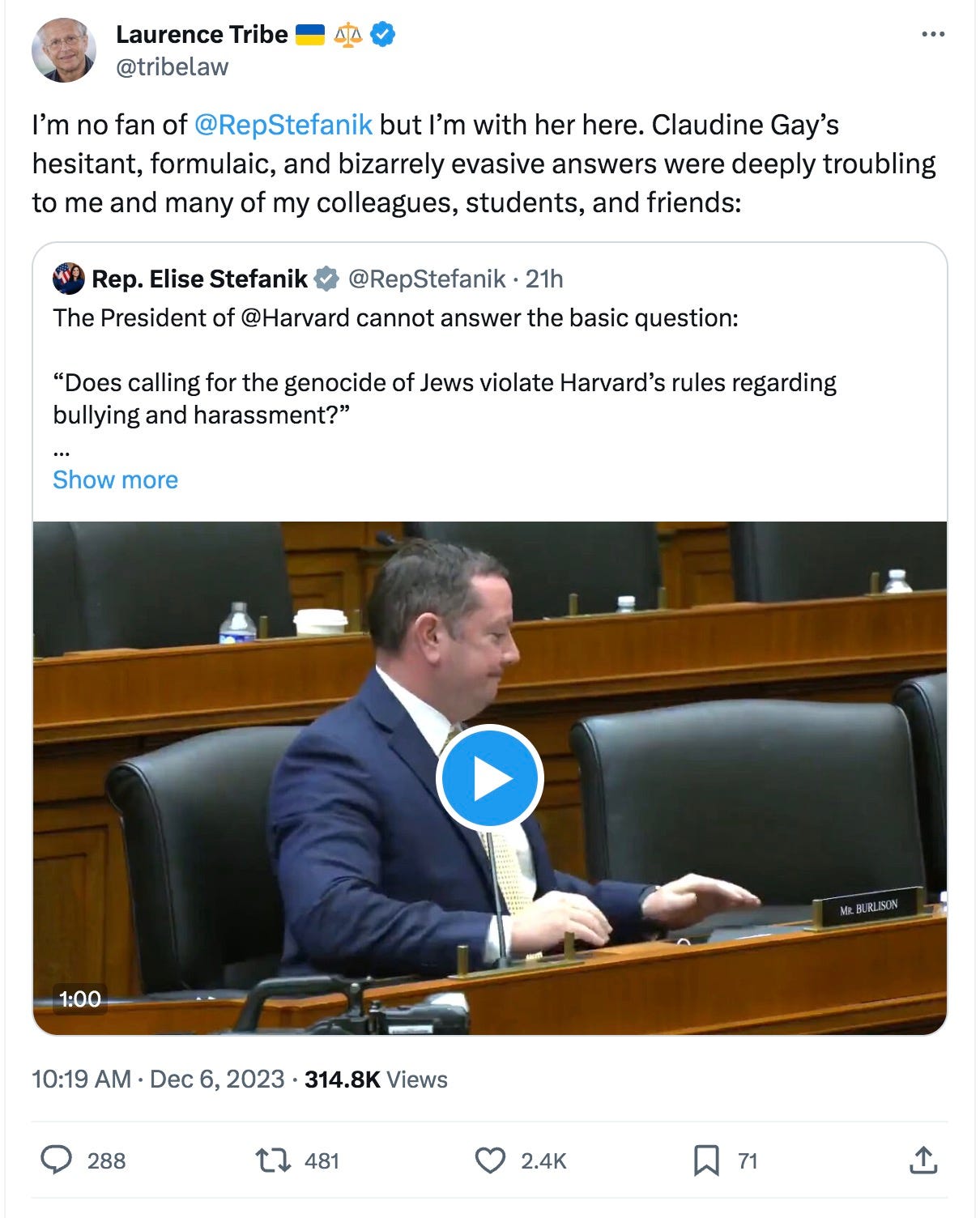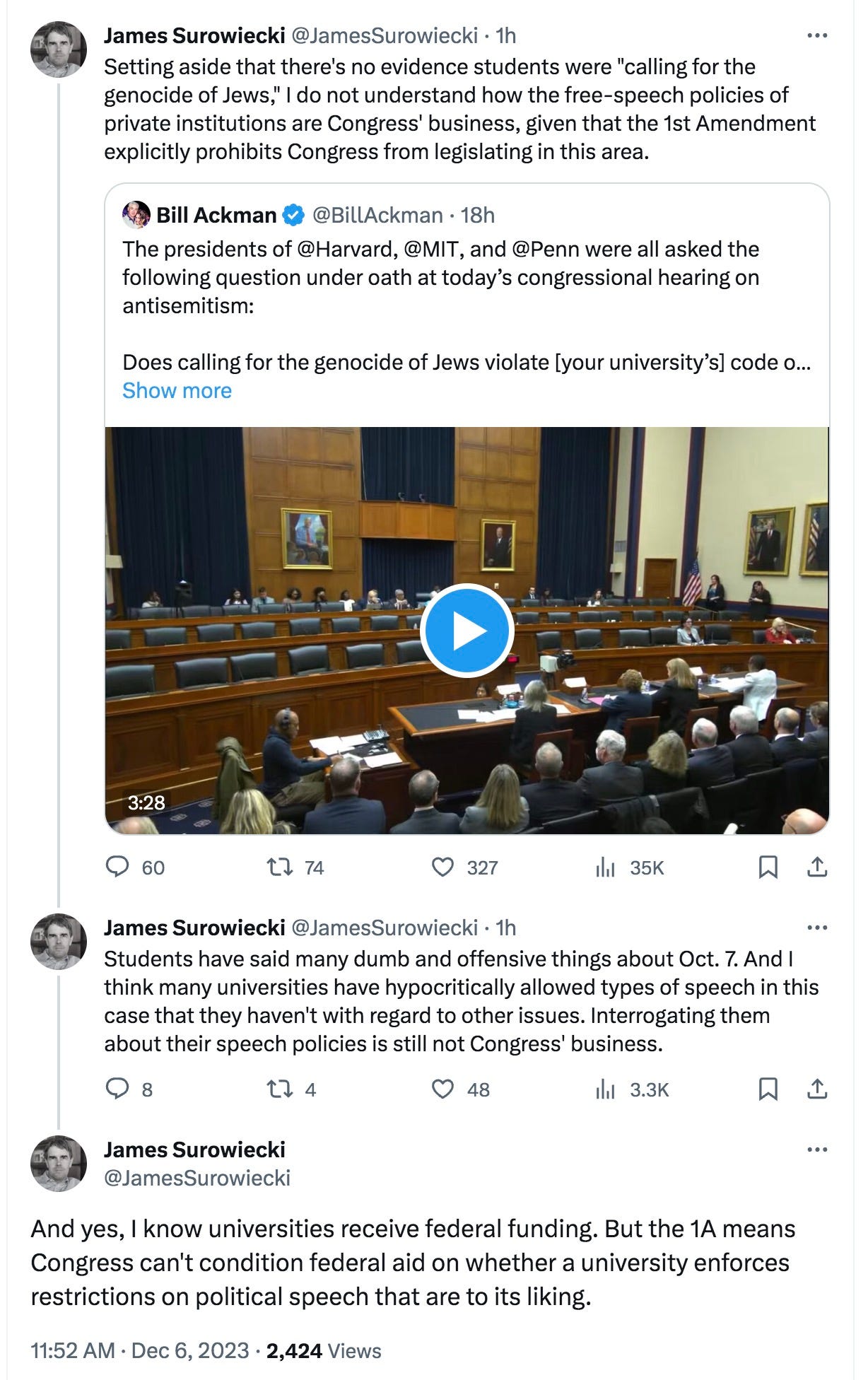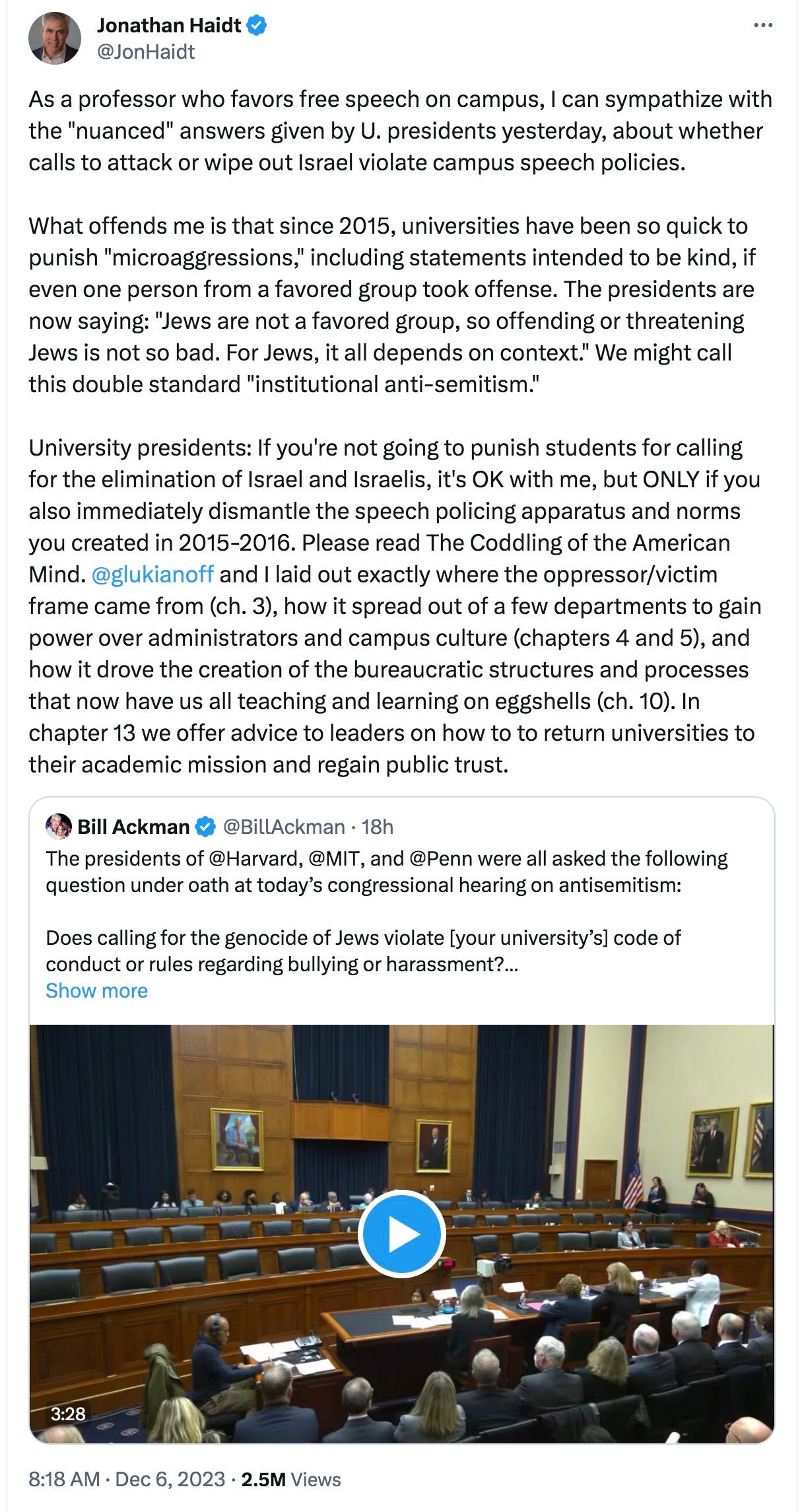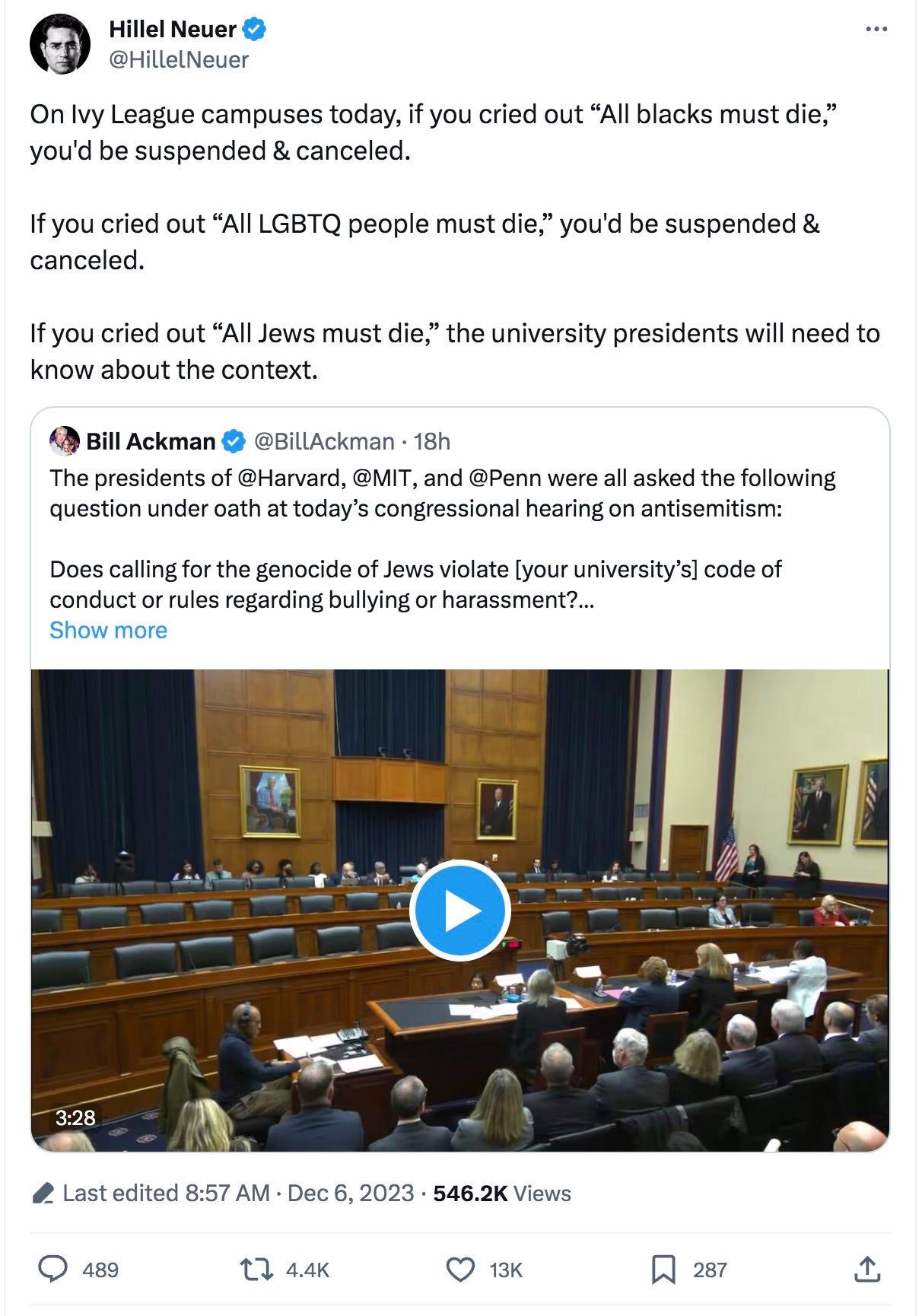E-Pluribus | December 6, 2023
The First Amendment protects 'hate speech'; free speech and the Israel-Hamas war; civil liberties and the common good.
A round-up of the latest and best musings on the rise of illiberalism in the public discourse:
J.D. Tuccille: Even Hateful Protests Are Protected, Free Speech Group Reminds Congress
In years past, the American Civil Liberties Union defended the First Amendment rights of neo-Nazis and the Ku Klux Klan, among others, arguing that the First Amendment does not have an exception clause for unpopular opinions and beliefs. When hateful speech is right in front of us rather than decades removed, it’s more difficult to maintain the same spirit of equanimity and tolerance. J.D. Tuccille reminds readers at Reason (even as others are reminding Congress this week) that protecting the free speech rights of only some just can’t work.
When free-speech rights are respected and protected, they're available for everybody to use out in the open. If one side is suppressed, its supporters may not be able to publicly air their views, but they still hold them and share them in private—and may feel that much more justified because of state action.
Open, loud, and peaceful speech—no matter how objectionable—is far preferable to the alternative. The killing of Paul Kessler in California and the shootings of Kinnan Abdalhamid, Tahseen Ali Ahmad, and Hisham Awartani in Vermont remind us that there are far worse forms of expressing strongly held sentiments than harsh words.
"Rather than try to define 'antisemitism,' Congress should help institutions consistently recognize and apply the distinctions between protected expression, categorically unprotected speech, and non-expressive conduct that lies beyond the First Amendment's protection," FIRE's Cohn and Gonzalez remind Congress. They recommend that lawmakers focus their efforts on ethnic and religious discrimination at educational institutions, and on actual cases of harassment.
That may not be satisfactory to people outraged by sometimes hateful protesters and the sentiments they express. But this moment will pass, and other disagreements will emerge. If we protect speech rights now, free expression will remain available and unconstrained for use in those disputes.
Read it all here.
Michelle Goldberg: The Backlash to Anti-Israel Protests Threatens Free Speech
In the 1980s, the Sandinistas of Nicaragua were either “terrorist authoritarians” or “freedom fighters.” Yet many in this country protested and marched on their behalf. Sandinista Daniel Ortega is president of Nicaragua these days, and the State Department discourages Americans from visiting the country due to “limited healthcare availability,” “arbitrary enforcement of laws,” “and wrongful detentions,” so we see how that worked out. Today, many are marching on behalf of the Palestinians in Gaza (and, by extension, their rulers, Hamas.) Michelle Goldberg of the New York Times warns against the selective application of free speech principles, even in the midst of the continuing conflict.
[T]he backlash to pro-Palestinian activism is building. On Tuesday, Penn’s president, along with the presidents of Harvard and M.I.T., is scheduled to appear [see Around Twitter (X) below] before Congress for a hearing titled, “Holding Campus Leaders Accountable and Confronting Antisemitism.” Both New York University and Berkeley are being sued by people who claim that they’ve allowed antisemitism to flourish. Big donors at several schools are yanking funding. Chris Rufo, the right-wing activist who whipped up nationwide campaigns against critical race theory and diversity, equity and inclusion initiatives, told me he’s part of a group at the conservative Manhattan Institute workshopping new policy proposals targeting what it sees as campus antisemitism.
But there’s a fierce political debate about what antisemitism is. Supporters of Israel often promote a definition of antisemitism put out by the International Holocaust Remembrance Alliance in 2016 that defines rejection or demonization of the Jewish state as a form of anti-Jewish bigotry. According to the alliance’s definition, one example of contemporary antisemitism is “claiming that the existence of a state of Israel is a racist endeavor.” Another is applying double standards to Israel by “requiring of it a behavior not expected or demanded of any other democratic nation.” The question of what constitutes double standards is not one that can be easily codified, and one of the experts who helped draft the alliance’s definition argues against its use to circumscribe campus speech.
Nevertheless, that definition keeps gaining legal traction. The Trump administration issued an executive order adopting it for the purposes of enforcing federal civil rights law. Last month the House passed an amendment to an appropriations bill that would deny federal funds to any college or university that “authorizes, facilitates, provides funding for or otherwise supports any event promoting antisemitism” under the definition. This week the House will vote on a resolution embracing the definition and proclaiming that “anti-Zionism is antisemitism.” Some schools, including Harvard, are facing alumni pressure to adopt the alliance’s definition on their own, and the definition is key to the lawsuit against Berkeley.
Read the whole thing.
Sherif Girgis: Civil Liberties Don’t Impede the Common Good—They Advance It
At The Dispatch, Sherif Girgis takes a new look at Princeton professor Robert P. George’s 1993 book Making Men Moral. Americans have long argued over the extent to which government can and should regulate individual conduct, and Girgis says that George’s thoughts on balancing of governmental powers of legislation and enforcement with the protection of civil liberties remain relevant today.
This year marks the 30th anniversary of the publication of [Robert P. George’s] book that made his career: Making Men Moral: Civil Liberties and Public Morality, released by Oxford University Press in late 1993. The book got George tenure at Princeton and undergirds many of his later works, but it is especially worth revisiting today to make sense of current debates about the relationship between law and morality—and as a model of how to conduct all our debates.
Making Men Moral charts a middle path between extremes. On the one hand, some liberals or libertarians hope to achieve a morally neutral politics. On the other hand, some on the left and right would too readily curtail civil liberties in the name of their visions of a good society. But George embraces both morality’s proper place in politics and a robust regime of civil liberties. And he does so while modeling rigor, civility, and courage—all in short supply today.
[. . .]
[I]n Making Men Moral, George argues that moral neutrality in politics is neither possible nor desirable, and that there is nothing inherently unjust about morals laws. Law often reflects some vision of what the common good of the political community demands. On many issues, the law cannot avoid taking a stand—it will assume one controversial political-moral vision of the common good or another. On abortion, for example, the law will either protect the prenatal life against intentional killing, or it will not. To permit elective abortion at a given stage is to treat the life at that stage as less than a moral person, or to treat the mother’s autonomy as overriding, or both. Prohibiting abortion does the opposite. But this inevitability isn’t a problem, George urges, because the whole point of law is to serve the common good. And, because the common good includes people’s moral integrity, there is nothing inherently wrong with morals laws like bans on pornography or animal cruelty, assuming the banned activities really are morally corrupting (a moral inquiry he leaves for future work). No principle of justice rules out such laws for all times and places.
George grants that laws cannot “make men moral” directly. Someone who avoids a vice just to avoid legal punishment “realizes no moral good,” in his words. But George does hold that morals laws can serve the common good, precisely because moral integrity is an aspect of human wellbeing that can be affected by others’ actions, just as health and safety are. (Thus our legal tradition’s formulation of police powers—the just aims of state action—refers to the protection of health, safety, morals, and the general welfare.) If a “physical environment marred by pollution jeopardizes people’s physical health,” so does “a social environment abounding in vice threaten their moral well-being and integrity.” Each person’s conduct, whether morally upright or corrupt, contributes to a moral culture—“expectations and understandings”—that will make any given form of moral corruption either harder or easier for others to resist. So just as isolated acts of dumping waste can (in the aggregate) harm others’ health, so can individuals’ vices (in the aggregate) harm others’ moral integrity.
Private vice, in other words, has public consequences. If the state may regulate littering to save our physical ecology, George concludes, it may regulate vice to guard our moral ecology.
Read it all.
Around Twitter (X)
The testimony of three university presidents (Harvard, University of Pennsylvania, and Massachusetts Institute of Technology) before Congress on Tuesday has caused a huge stir on social media. Below is a selection of the reactions to the question of calls for genocide as bullying or harassment:
And finally, Hillel Neuer:



